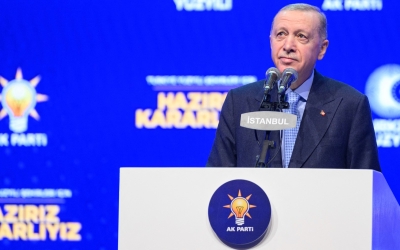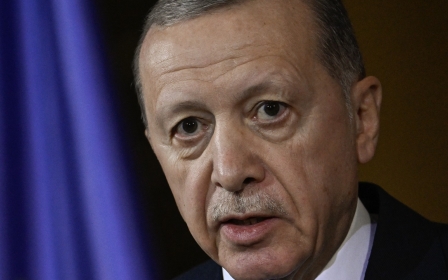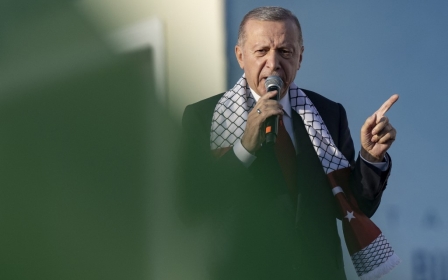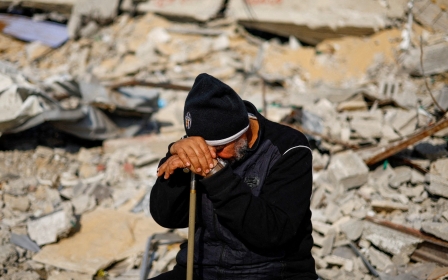Turkey local elections: How Erdogan's Israel policy backfired
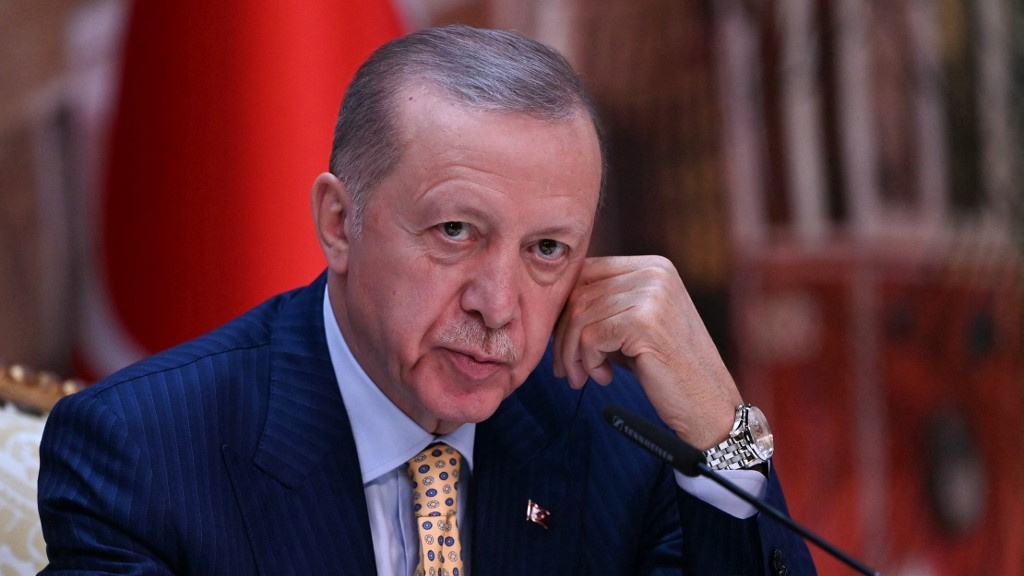
When Turkish President Recep Tayyip Erdogan was campaigning earlier this year for local elections in the conservative stronghold of Sakarya, addressing thousands of people at a rally, the mood was cheerful. But then a banner appeared in the crowd, and the mood shifted: “End the shame of trade with Israel.”
As cameras focused on the banner, officers at the event quickly had it removed, escorting out the demonstrators who held it. Erdogan didn’t comment on the banner, and it isn’t clear whether he even saw it.
A month later, Erdogan’s ruling Justice and Development Party (AKP) won the mayoral race in Sakarya, but its vote share dropped by 18 percentage points compared with the 2019 municipal elections. It lost three districts to a new Islamist party that campaigned heavily on cutting ties with Israel over its war on Gaza: the New Welfare Party (YRP).
Throughout the country, the party denied victories to Erdogan’s AKP or weakened the ruling party’s candidates by splitting the conservative vote. The AKP was ultimately defeated in Turkey’s five largest cities and saw a significant drop in votes nationwide, resulting in the main opposition Republican People’s Party (CHP) coming out ahead by two percentage points.
There is a consensus that the country’s economic problems, including declining real pensions and salaries amid runaway inflation, played a primary role in the AKP’s electoral defeat.
While Turkey’s continuing trade with Israel was not the biggest issue prompting conservative voters to stay home or switch parties, it was a factor among others, which even Erdogan acknowledged during a party meeting earlier this week on the election results, according to party sources.
Speaking about the AKP’s worst election defeat since 2002, Erdogan said on Tuesday: “Unfortunately, even on an issue like the Gaza crisis, for which we did everything we could and paid the price, we failed to fend off political attacks and convince some people.”
Turkish-Israeli trade ties
How could this happen? Even Israeli Foreign Minister Israel Katz said it appeared that Turkish voters were punishing Erdogan for attacking Israel. This followed remarks last year from Energy Minister Eli Cohen that Turkey was “host[ing] arch-terrorists and encourag[ing] terrorist organizations” against Israel.
Since the 7 October Hamas attack and subsequent Israeli war on Gaza, which Erdogan calls genocidal, Turkey has gradually increased its criticism of Tel Aviv. It recalled its ambassador for consultations, suspended energy talks, and backed Palestine on the international stage, from the UN General Assembly to western capitals through the Gaza Contact Group. Ankara also floated the idea of a guarantorship system to work towards a two-state solution.
Follow Middle East Eye's live coverage of the Israel-Palestine war
In the early months of the conflict, while western capitals backed Israel’s war on Gaza, Erdogan used his platform to expose its genocidal actions. Turkey is also the largest humanitarian donor to Gaza, along with the UAE, according to Israeli government data, while dozens of Palestinian patients have travelled to Turkey from Gaza for medical treatment.
But it has avoided more punitive steps, arguing that they haven’t worked in the past when Ankara faced other crises with Tel Aviv. Although bilateral trade with Israel has dropped by 33 percent since 7 October, it has nonetheless continued.
Others showed their rejection of the government's trade policy by writing 'Gaza' or 'end the trade with Israel' on their ballot papers
Last year, as Turkish parliamentarians and pro-government circles boycotted companies accused of supporting Israel, one Turkish journalist began spotlighting the Turkish-Israeli trade. Metin Cihan, who lives in exile in Germany due to his past reporting on the killing of a Turkish girl, dug into open-source data on maritime trade.
“While Israel’s massacre continues, I listed the ships shipping from Turkey to Israel,” he posted on X (formerly Twitter) on 12 November, including the names of dozens of ships. He later shared another list, noting: “We were shipping from our ports to Israel with an average of seven ships a day. We sent 13 more ships yesterday.”
As he started to regularly publish the names of ships going between Israel and Turkey, his tweets received millions of views. “Israel’s crude oil, fuel, iron and steel, etc. logistics were provided through our ports,” he said.
Cihan has also exposed persons and companies close to the government that trade with Israel.
“Do you know who owns Hatay Ro Ro [ship], which is currently in the Haifa port of Israel?” he asked on 13 November. “AK Party Hatay metropolitan mayor candidate Ibrahim Guler. Even as the massacre continues in Gaza, [Turkey] continues its shipments to Israel without a break.” Guler later said that he had sold the ship prior to 7 October.
More recently, Cihan reported that Ankara was still permitting the sale of hunting gear to Israel by private companies.
Into the YRP's arms
On the issue of trade, Ankara doesn’t believe in collectively punishing Israeli society by cutting ties altogether, which would also negatively affect Palestinians in the occupied territories. Even after the 2010 Mavi Marmara massacre, Turkey did not end its bilateral trade relationship with Israel.
Cihan’s reporting, however, triggered a wave of criticism among traditional AKP voters. Small groups began to pop up at Erdogan’s rallies, holding banners that called for an end to the country’s trade with Israel. Some protesters were briefly detained last week during a rally in Sultanbeyli.
Others showed their rejection of the government’s trade policy by writing “Gaza” or “end the trade with Israel” on their ballot papers on the day of the election.
Pollster Ahmet Turan Han told Middle East Eye earlier this week that Ankara’s continuing trade with Israel pushed some deeply conservative voters into the arms of the YRP, which campaigned heavily on this topic, among others, including high-interest-based monetary policy and stray dogs.
Turkish Trade Minister Omer Bolat said last week that since the invasion of Gaza, “public institutions and state-owned companies never do business with Israel”.
But Cihan published yet another document on Wednesday, showing that Eti Maden, a Turkish company owned by the government’s Wealth Fund, delivered 21 tons of powdered boric acid on 1 April to Fertilizers & Chemicals Ltd, a large Israeli company that produces various chemicals. Neither the government nor the company commented on this.
YRP leader Fatih Erbakan quickly seized the opportunity and shared the same document online.
"As the New Welfare Party, we call on the authorities once again: GET RID OF THIS GREAT PLAGUE ASAP!" he said.
As Erdogan said, the government may need to adjust his policy regarding Israel as he is complaining about being unfairly judged by the wider public. And this could result in a need to better inspect trade with Israel in the coming weeks, and deny goods that could be used for military purposes.
Otherwise it may continue to undermine Erdogan's outreach to more pious voters. It is hard to say whether this could cause permanent damage among the electorate, but everyone knows how sensitive Erdogan feels about his own voting groups.
The views expressed in this article belong to the author and do not necessarily reflect the editorial policy of Middle East Eye.
Middle East Eye propose une couverture et une analyse indépendantes et incomparables du Moyen-Orient, de l’Afrique du Nord et d’autres régions du monde. Pour en savoir plus sur la reprise de ce contenu et les frais qui s’appliquent, veuillez remplir ce formulaire [en anglais]. Pour en savoir plus sur MEE, cliquez ici [en anglais].



